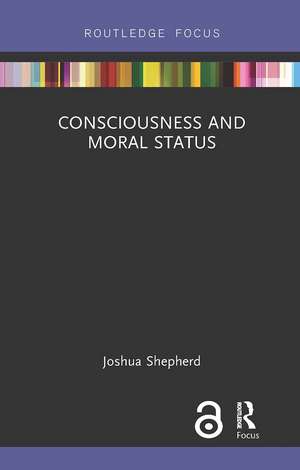Consciousness and Moral Status: Routledge Focus on Philosophy
Autor Joshua Shepherden Limba Engleză Paperback – 18 dec 2020
It seems obvious that phenomenally conscious experience is something of great value, and that this value maps onto a range of important ethical issues. For example, claims about the value of life for those in Permanent Vegetative State (PVS); debates about treatment and study of disorders of consciousness; controversies about end-of-life care for those with advanced dementia; and arguments about the moral status of embryos, fetuses, and non-human animals arguably turn on the moral significance of various facts about consciousness. However, though work has been done on the moral significance of elements of consciousness, such as pain and pleasure, little explicit attention has been devoted to the ethical significance of consciousness.
In this book Joshua Shepherd presents a systematic account of the value present within conscious experience. This account emphasizes not only the nature of consciousness, but also the importance of items within experience such as affect, valence, and the complex overall shape of particular valuable experiences. Shepherd also relates this account to difficult cases involving non-humans and humans with disorders of consciousness, arguing that the value of consciousness influences and partially explains the degree of moral status a being possesses, without fully determining it. The upshot is a deeper understanding of both the moral importance of phenomenal consciousness and its relations to moral status.
This book will be of great interest to philosophers and students of ethics, bioethics, philosophy of psychology, philosophy of mind, and cognitive science.
| Toate formatele și edițiile | Preț | Express |
|---|---|---|
| Paperback (1) | 137.94 lei 6-8 săpt. | |
| Taylor & Francis – 18 dec 2020 | 137.94 lei 6-8 săpt. | |
| Hardback (1) | 334.25 lei 6-8 săpt. | |
| Taylor & Francis – 29 mai 2018 | 334.25 lei 6-8 săpt. |
Din seria Routledge Focus on Philosophy
-
 Preț: 385.63 lei
Preț: 385.63 lei -
 Preț: 386.78 lei
Preț: 386.78 lei -
 Preț: 159.85 lei
Preț: 159.85 lei -
 Preț: 152.16 lei
Preț: 152.16 lei -
 Preț: 174.37 lei
Preț: 174.37 lei -
 Preț: 153.30 lei
Preț: 153.30 lei -
 Preț: 153.05 lei
Preț: 153.05 lei -
 Preț: 152.79 lei
Preț: 152.79 lei -
 Preț: 152.67 lei
Preț: 152.67 lei -
 Preț: 170.51 lei
Preț: 170.51 lei -
 Preț: 377.24 lei
Preț: 377.24 lei - 8%
 Preț: 375.14 lei
Preț: 375.14 lei -
 Preț: 168.05 lei
Preț: 168.05 lei -
 Preț: 152.30 lei
Preț: 152.30 lei -
 Preț: 186.14 lei
Preț: 186.14 lei -
 Preț: 265.80 lei
Preț: 265.80 lei -
 Preț: 186.27 lei
Preț: 186.27 lei -
 Preț: 185.61 lei
Preț: 185.61 lei - 20%
 Preț: 142.32 lei
Preț: 142.32 lei -
 Preț: 152.11 lei
Preț: 152.11 lei -
 Preț: 186.53 lei
Preț: 186.53 lei - 15%
 Preț: 477.63 lei
Preț: 477.63 lei - 15%
 Preț: 418.76 lei
Preț: 418.76 lei -
 Preț: 186.03 lei
Preț: 186.03 lei -
 Preț: 170.51 lei
Preț: 170.51 lei - 18%
 Preț: 124.79 lei
Preț: 124.79 lei - 15%
 Preț: 452.06 lei
Preț: 452.06 lei -
 Preț: 461.66 lei
Preț: 461.66 lei - 15%
 Preț: 465.80 lei
Preț: 465.80 lei -
 Preț: 461.66 lei
Preț: 461.66 lei -
 Preț: 186.14 lei
Preț: 186.14 lei -
 Preț: 461.84 lei
Preț: 461.84 lei
Preț: 137.94 lei
Preț vechi: 175.70 lei
-21% Nou
26.40€ • 28.66$ • 22.17£
Carte tipărită la comandă
Livrare economică 22 aprilie-06 mai
Specificații
ISBN-10: 0367734370
Pagini: 122
Dimensiuni: 138 x 216 x 10 mm
Greutate: 0.23 kg
Ediția:1
Editura: Taylor & Francis
Colecția Routledge
Seria Routledge Focus on Philosophy
Locul publicării:Oxford, United Kingdom
Public țintă
Postgraduate and UndergraduateCuprins
Notă biografică
Descriere
It seems obvious that phenomenally conscious experience is something of great value, and that this value maps onto a range of important ethical issues. For example, claims about the value of life for those in Permanent Vegetative State (PVS); debates about treatment and study of disorders of consciousness; controversies about end-of-life care for those with advanced dementia; and arguments about the moral status of embryos, fetuses, and non-human animals arguably turn on the moral significance of various facts about consciousness. However, though work has been done on the moral significance of elements of consciousness, such as pain and pleasure, little explicit attention has been devoted to the ethical significance of consciousness.
In this book Joshua Shepherd presents a systematic account of the value present within conscious experience. This account emphasizes not only the nature of consciousness, but also the importance of items within experience such as affect, valence, and the complex overall shape of particular valuable experiences. Shepherd also relates this account to difficult cases involving non-humans and humans with disorders of consciousness, arguing that the value of consciousness influences and partially explains the degree of moral status a being possesses, without fully determining it. The upshot is a deeper understanding of both the moral importance of phenomenal consciousness and its relations to moral status.
This book will be of great interest to philosophers and students of ethics, bioethics, philosophy of psychology, philosophy of mind, and cognitive science.
